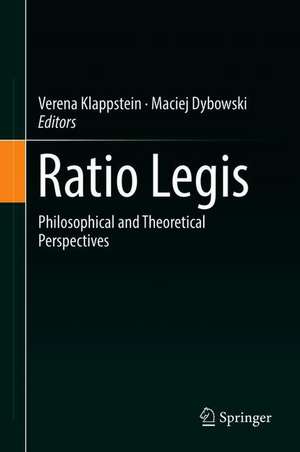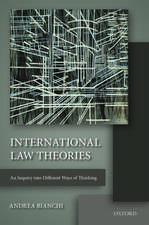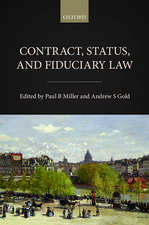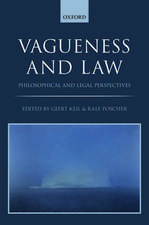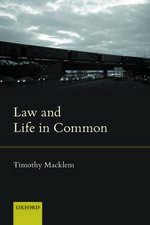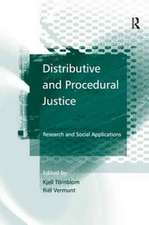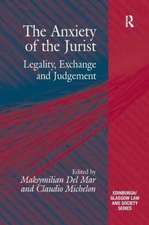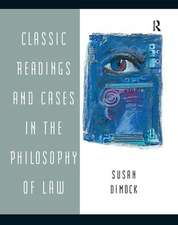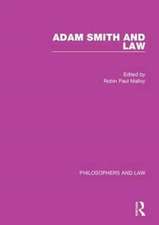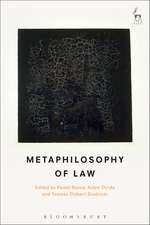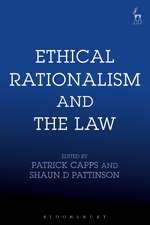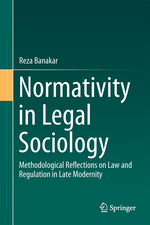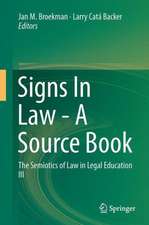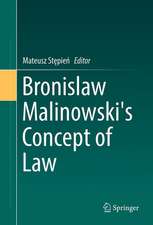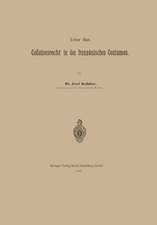Ratio Legis: Philosophical and Theoretical Perspectives
Editat de Verena Klappstein, Maciej Dybowskien Limba Engleză Hardback – 14 mai 2018
Though the ratio legis argument is widely used, much about it warrants further investigation. On the general philosophical map there are many overlapping areas that concern different approaches to human rationality and to the problems of practical reasoning. Particular problems with ratio legis arise in connection with different perspectives on legal philosophy and theory, especially in terms of the methods that lawyers use for legal interpretation and argumentation. These problems can be further subdivided into particular aspects of activities undertaken by lawyers and officials who use the ratio legis in their work, and the underlying theories. In short, this book examines what ratio legis is, what it could be, and its practical implications.
| Toate formatele și edițiile | Preț | Express |
|---|---|---|
| Paperback (1) | 636.45 lei 6-8 săpt. | |
| Springer International Publishing – 12 ian 2019 | 636.45 lei 6-8 săpt. | |
| Hardback (1) | 892.28 lei 6-8 săpt. | |
| Springer International Publishing – 14 mai 2018 | 892.28 lei 6-8 săpt. |
Preț: 892.28 lei
Preț vechi: 1088.15 lei
-18% Nou
Puncte Express: 1338
Preț estimativ în valută:
170.73€ • 178.28$ • 140.99£
170.73€ • 178.28$ • 140.99£
Carte tipărită la comandă
Livrare economică 15-29 aprilie
Preluare comenzi: 021 569.72.76
Specificații
ISBN-13: 9783319742700
ISBN-10: 3319742701
Pagini: 215
Ilustrații: X, 205 p. 113 illus., 1 illus. in color.
Dimensiuni: 155 x 235 mm
Greutate: 0.48 kg
Ediția:1st ed. 2018
Editura: Springer International Publishing
Colecția Springer
Locul publicării:Cham, Switzerland
ISBN-10: 3319742701
Pagini: 215
Ilustrații: X, 205 p. 113 illus., 1 illus. in color.
Dimensiuni: 155 x 235 mm
Greutate: 0.48 kg
Ediția:1st ed. 2018
Editura: Springer International Publishing
Colecția Springer
Locul publicării:Cham, Switzerland
Cuprins
Part I – What Is Ratio Legis? The Real Ratio Legis and Where to Find It - A Few Pragmatic Considerations by Adam Dyrda.- Ratio Legis as a Binding Legal Value by Marzena Kordela.- Articulating Ratio Legis and Practical Reasoning by Maciej Dybowski.- Legislative History, Ratio Legis and the Concept of the Rational Legislator by Michał Krotoszyński.- Part II – What Can Ratio Legis Be? The concept of purpose in Kant’s Metaphysical Elements of Justice by Verena Klappstein.- Nonconsequential Conception of Neutrality by Wojciech Ciszewski.- Is There a Imitative Ratio Legis and If So, How Many Are There? Psychological Perspective by Teresa Chirkowska-Smolak and Marek Smolak.- Part III – What Practical Implications Can Ratio Legis Have? Immanent Ratio Legis? Legal Forms and Statutory Interpretation by Konstanze von Schütz.- How Can Ratio Legis Help a Lawyer to Interpret a Legal Text? Employing the Purpose of a Regulation for Legal Interpretation by Mikołaj Hermann.
Notă biografică
Dr. iur. Verena Klappstein M.A., LL.M. is Habilitandin at University of Passau (Faculty of law, Professorship for German and European Private Law, Civil Procedural Law and Legal Theory of Prof. Dr. Thomas Riehm). The working title of her Habilitation based on Kantian Moral Philosophy is: “Vertragsfreiheit durch Kontrahierungszwang und -verbot” (Freedom of Contract via obligation to and prohibition to contract). Her main research areas are Private, Company and Business Law, Legal Philosophy and Philosophy of Science.
Dr Maciej Dybowski is a lawyer and a philosopher, working as an assistant professor at the Chair of Theory and Philosophy of Law, Faculty of Law and Administration, Adam Mickiewicz University in Poznań, Poland. His main fields of research include philosophy of law, neopragmatism, law and language, philosophy of human rights.
Textul de pe ultima copertă
The book is dedicated to the theoretical problems concerning ratio legis. In the contexts of legal interpretation and legal reasoning, the two most important intellectual tools employed by lawyers, ratio legis would seem to offer an extremely powerful argument. Declaring the ratio legis of a statute can lead to a u-turn argumentation throughout the lifespan of the statute itself – in parliament, or in practice during court sessions, when it is tested against the constitution.
Though the ratio legis argument is widely used, much about it warrants further investigation. On the general philosophical map there are many overlapping areas that concern different approaches to human rationality and to the problems of practical reasoning. Particular problems with ratio legis arise in connection with different perspectives on legal philosophy and theory, especially in terms of the methods that lawyers use for legal interpretation and argumentation. These problems can be further subdivided into particular aspects of activities undertaken by lawyers and officials who use the ratio legis in their work, and the underlying theories. In short, this book examines what ratio legis is, what it could be, and its practical implications.
Though the ratio legis argument is widely used, much about it warrants further investigation. On the general philosophical map there are many overlapping areas that concern different approaches to human rationality and to the problems of practical reasoning. Particular problems with ratio legis arise in connection with different perspectives on legal philosophy and theory, especially in terms of the methods that lawyers use for legal interpretation and argumentation. These problems can be further subdivided into particular aspects of activities undertaken by lawyers and officials who use the ratio legis in their work, and the underlying theories. In short, this book examines what ratio legis is, what it could be, and its practical implications.
Caracteristici
First academic work dedicated to the theoretical problems of ratio legis Examines what ratio legis is, what it could be, and its practical implications Legal practitioners globally use ratio legis in interpretation and reasoning without recourse to thorough theoretical background which is provided by our book
